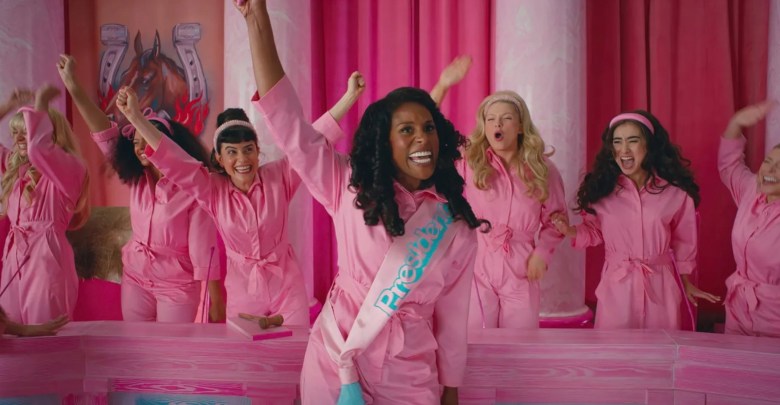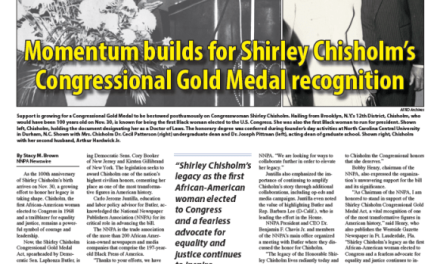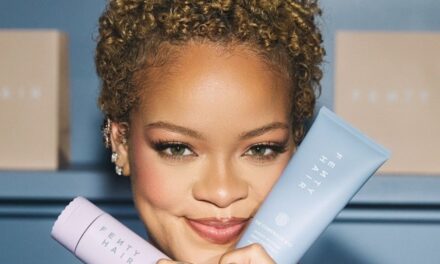By Miss AJ Williams
July 23, 2023
Previously published by New Pittsburgh Courier
The Barbie movie, starring Margot Robbie and Issa Rae, blazes a trail of female empowerment in cinema. In an industry often mired in stale gender stereotypes and limited portrayals of women, this bold parody challenges the status quo, turning the tables on traditional gender roles to present a world where women take center stage and lead the charge.
The movie’s premise holds the potential to upend societal power dynamics by showcasing women in positions of authority and influence. It dares to imagine a world where women lead industries, govern nations, and spearhead societal progress. Through clever humor and sharp wit, the satire becomes a powerful mirror, reflecting the regressive beliefs that persist in our contemporary reality. By daring to challenge these norms, the film entertains and sparks crucial conversations about gender equality and women’s empowerment.
America Has a Problem
Being a woman in America is a unique journey filled with both triumphs and challenges, especially in the form of self-acceptance and societal expectations. From the early stages of childhood, girls are bombarded with standards generated by a male-dominated society that can often feel contradictory and overwhelming.
In the land of opportunities, girls are told they can achieve anything they set their minds to. They are encouraged to pursue education, excel in their careers, and become independent individuals. However, alongside this message of empowerment, they are also subjected to societal pressure to fit into certain molds. The notion of “having it all” is often portrayed as the ultimate goal, but it can create an impossible standard to meet.
In the Barbie movie, America Ferrera plays Gloria, a lifetime Barbie lover and assistant to the chief executive of Mattel. In one scene, Gloria gives a passionate monologue about the contradictory expectations placed on women in America. She says:
“But it’s too hard. It’s too contradictory. You can’t be everything to everyone. And I’m just so tired of watching myself, and every single other woman, tie herself into knots so that people will like us. I’m tired of being told that I’m not good enough.”
Gloria’s monologue is a powerful and moving indictment of the unrealistic societal expectations placed on women. It is a reminder that women are constantly flooded with messages about how they should look, act, and behave. These messages can be incredibly damaging, leading to low self-esteem, anxiety, and depression.
The monologue also speaks to the importance of self-acceptance. Gloria challenges women to stop trying to be someone they’re not and to embrace their true selves. This message is more important than ever in today’s world, where social media and other media constantly bombard us with images of idealized beauty and perfection.
Critique of Patriarchal Norms
In our present day, women have made undeniable strides, shattered barriers, and proven their worth in every sphere of life. Yet, we cannot ignore the deep-rooted social constructs and biases that continue to hinder their progress. The Barbie parody lays bare the absurdity of viewing women as subservient to men, urging us to introspect and dismantle the societal limitations that continue to hold us back.
By portraying a world where men occupy traditionally feminine roles, the movie confronts ingrained biases and prompts audiences to question the very foundation of these stereotypes. It will reflect real-life experiences where women often face resistance and skepticism when they strive for leadership positions or enter male-dominated fields. This approach fosters empathy and understanding, encouraging us to dismantle stereotypes and embrace true gender equality.
The movie’s storytelling lies in its celebration of female empowerment and its unapologetic exposure of the brash, outdated themes that have long perpetuated a patriarchal society. Through clever satire and creative storytelling, the film unabashedly lays bare the toxic notions hindering progress and equality for generations. By reversing traditional gender roles, the movie boldly confronts viewers with the absurdity of the status quo, prompting introspection and calls for change.
The portrayal of men occupying traditionally feminine roles in the film is a powerful commentary on the entrenched expectations and limitations that society places upon individuals based on their gender. It challenges the stereotype that men must be stoic, dominant, and unemotional, while women are expected to be nurturing, submissive, and secondary. By turning these norms on their head, the movie reminds us that gender should not dictate one’s aspirations, talents, or worth. It urges us to break free from the suffocating molds society imposes, allowing everyone to express themselves authentically.
The movie’s fearless critique of patriarchal norms extends to the workplace, where gender inequality often rears its ugly head. By portraying women in positions of power and influence, the film exposes the systemic bias that has long prevented women from reaching the same heights as their male counterparts. It takes aim at the glass ceiling, inviting audiences to question why talented, capable women are still underrepresented in leadership roles across various industries.

A Diverse Cast to Celebrate All Women
Furthermore, the collaboration between Margot Robbie and Issa Rae, two immensely talented actresses from diverse backgrounds, reinforces the concept of intersectional feminism. It underscores the importance of inclusive representation in media, acknowledging the unique challenges women of different ethnicities, cultures, and backgrounds face. Through this collaboration, the movie exemplifies the strength of unity and solidarity among women.
The film’s director, Greta Gerwig, has said that she wanted to create a Barbie movie that would be ‘inclusive and representative of the world we live in today.’ She has also said that she wanted to challenge the traditional stereotypes associated with Barbie, such as the idea that Barbie is only for white, thin, and beautiful women.
The film’s diverse cast includes Simu Liu, Hari Nef, and Alexandra Shipp. Liu is a Chinese-Canadian actor best known for his role in the Marvel Cinematic Universe. Nef is a transgender actress in several television shows and films. Shipp is a black actress who has starred in movies such as X-Men: Apocalypse and Straight Outta Compton.
The Barbie movie’s diverse cast is a welcome change from the traditional Barbie movies, which have often been criticized for promoting unrealistic beauty standards and reinforcing gender stereotypes. The film’s diverse cast sends a powerful message to young girls that they can be anything they want, regardless of race, ethnicity, or body type.
‘Barbie’ signifies a pivotal moment in cinema—a moment where we challenge outdated norms and embrace the power of female empowerment.
About Post Author

Miss AJ Williams
AJ Williams is a Spiritual Wellness Educator, Speaker, and Author with experience in print, radio, and television. She is currently Michigan Chronicle’s Managing Editor, City.Life.Style. Editor and resident astrologer. Follow her on IG, TikTok and Twitter @MissAJWilliams — www.MissAJWilliams.com
The post Barbie: A parody on female empowerment and outdated patriarchy appeared first on AFRO American Newspapers .











